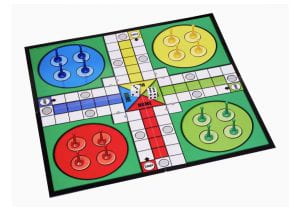Preset:
- A basic version of Parcheesi.
- Some coins.
- 6 written alliances symbol.

First part: Rule of normal Parcheesi.
- Roll 2 dice each turn, if there’s a five (the sum of 2 dice equals 5 is also ok), put one piece to the start position and move.
- The 2 dice can be used to move 2 pieces. If you roll a double, you can have another chance to roll the dice.
- When you pass a piece of another color, you can send them back to the home unless they are in a safety place.
- One grid can only stand 2 pieces. If there’s 2, it’s a wall and pieces can’t go across it.
- You should have exactly the same steps to go to the end point.

Second part: Rule of appropriation (Coins)
1. How to get coins:
- If you pass through someone’s piece and don’t send it back, you can get one coin. It seems as you build an alliance with this person and both of you take one coin. One move can only get at most 1 coin from 1 person.
- One player can only build an alliance with one player. When he builds an alliance with another player or makes an offensive action (send the piece back, use 5 coins …), it seems as a betrayal. This player can get one coin. Also, players can’t build an alliance and betray the same player in one same turn.
2. Usage of coin:
- 1 coin can build a safety place for a grid once/one turn for yourself only.
- 5 coins can send a piece back to the start
- 10 coins can send a piece to the end directly.
- Every effect can be denied by the same number of coins.
 (Yellow is about to win but green pays 5 coins to send the final piece back).
(Yellow is about to win but green pays 5 coins to send the final piece back).
3. Some other things:
- Oral alliance and coin transactions are allowed in the game.
- Important!!! This is a personal game. The only method to win is to send all of your pieces to the end point. Alliance is not considered as winning together.
 (Playing with the coins and alliances).
(Playing with the coins and alliances).
Art Statement:
Like what I said in my self-introduction, I’m an enthusiast in PvP games — especially the games that make conflict both tactically and technically between players. I really love the players thinking a bunch of things before they make a choice in the game. So, that’s how my game is born with the central concept — “trust” and “betrayal”.
Like the Dada artist made their works to show their anti-war attitude, my game satires the war itself — your alliance can betray you at any time for their own benefits. Like the wisdom said, “Neither friends nor rivals are everlasting, but only profits.” Raising war only means to put yourself in a dangerous condition since there’s always no winner. Additionally, it’s like turning a game from our childhood to the deep dark meaning in the adults’ world!
Back to the game itself, based on the basic Parcheesi, I add a new thing into it — coins. When I play the Parcheesi, I found that players want to beg another player not to send their piece back but the rule forces. Also, players always form alliances to oppose the strongest player. Thus, I change the rule to allow the players to do what they want — they can form alliances to earn the coin which can save their pieces, however, they can only build alliances with one player and can get betrayed at any time. Also, since the target of the game has not been changed, alliances are not considered in winning. Only one player can win, a teammate is just a tool for the winner. In the first iteration of my game, the coin can only make the safety space and the player has 1 way to earn a coin — not to send enemy pieces back. I allow the players to do coin transactions as they want — “I give you one coin and you send his piece back” like this. Then, Jackson told me players should have more ways to earn and use the coins, the coin transaction is too free. I really love his idea, so in my final iteration, I make a large improvement in the coin mechanics. I encourage the players to build alliances and betray each other — they can earn more coins. Also, 5 and 10 coins can have a large power in the game but can be canceled by using the same amount of coins. This is how I make the coins important and promote the interaction between players. The alliances sign is for the players to remember the alliances more easily.
I did the play test with my roommates and they really love this game. One of my roommates loves to betray teammates and then say some words to satirize the other players — this is what I want in the game. (Although that caused another roommate don’t want to play this game with him any more). (This is what happened from his anger).
(This is what happened from his anger).
